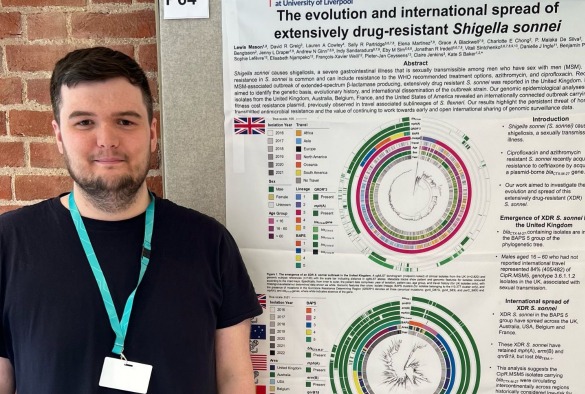Lewis Mason is a 3rd Year PhD Medical Microbiology student in the Department of Clinical Infection, Microbiology, and Immunology. His PhD is funded by the NIHR HPRU in Gastrointestinal Infections at University of Liverpool and his research focusses on the surveillance of antimicrobial resistance (AMR) and epidemiological changes in sexually transmissible intestinal infections, especially Shigella sonnei.
My favourite thing about being a PhD student is seeing how my research makes a real-life impact on science and public health. I know that by working on this research I am helping to make a difference to people’s lives.
What is Shigella?
Shigella is a bacterium which causes a serious gastrointestinal infection called shigellosis. It’s responsible for around 212,400 deaths globally per year and can either be transmitted by eating or drinking food and water contaminated with human faeces, or by sexual transmission, which disproportionately affects gay, bisexual, and other men who have sex with men.
In higher-income nations, shigellosis is usually a self-limiting illness, where the patient is treated with oral-rehydration solutions and the infection is cleared by the body on its own. However, immunocompromised individuals and particularly invasive cases of shigellosis may require treatment with antibiotics. Unfortunately, this particular strain of interest is resistant to the majority of antibiotics recommended for its treatment. Recently, the UK Health Security Agency (UKHSA) published a press release and research article on this rise in extensively drug-resistant bacteria.
Tacking a public health issue
I am working with the University’s National Institute for Health and Care Research, Health Protection Research Unit in Gastrointestinal Infections (NIHR HPRU GI) on an international collaboration between scientists and public health workers from the UK, France, Belgium, Australia, and the United States of America.
Through our research, including genome sequencing, we have mapped the international spread of the Shigella bacteria and identified the genes which make the bacteria resistant to antibiotics. By better understanding the drivers behind the epidemic we can predict and prevent future outbreaks.
The future for me and my research
My research is contributing to my PhD thesis and the next phase of my work will see me further investigating the re-emergence and spread of other species of Shigella in the UK and ultimately, I will investigate antibiotic resistance profiles of various sexually transmissible intestinal infections.
Importantly, as my work continues, my skillset expands and my confidence grows. My PhD supervisors, lab group, and the NIHR HPRU GI are very supportive and enthusiastic in training me to become the best scientist that I can be. During my PhD, I have made sure to get involved with teaching and demonstrating, as in the future, I would like to be a higher education lecturer and research fellow in bacteriology and antimicrobial resistance.
